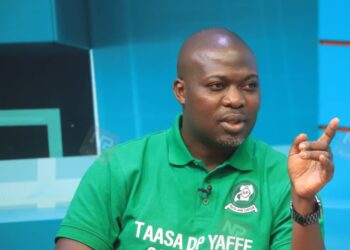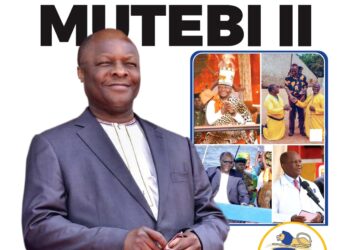By Brian Mugenyi
For the last 27 years, Michael J Ssali has carried and used his pen as a sword. He is a prominent and well-grounded journalist and lover of literature. Ssali has used his pen to benefit the community, particularly Masaka area and no one is more outstanding in the agriculture reporting more than this seventy year old.
Ssali has lived for writing, reading books and travelling. He has visited countries such as; Italy, South Africa and Netherlands because of his thinking cap and writing techniques that has earned him accolades.
“I started as a practising journalist for the Vision Group in 1992. I knew little about journalism but eventually it became part of my DNA,” says a soft-spoken Ssali fully clad in blue stripped shirt and jeans as he takes his seat at Daily Monitor’s bureau offices at Kamaggwa building in Masaka Town.
Ssali writes with flair, gathers facts with ease and research is his form of escapism. The 70-year-old who celebrated his birthday last month has not shown signs of bowing out from the news industry.
“I am a journalist for life. I will continue to write stories until when the heavenly father calls me in heavens,” shares a delighted Ssali as he puts down his spectacles on the table.
At his writing table which he refers to as ‘kitchen’ Ssali is surrounded by a looks of books; a handy dictionary and several magazines which he normally refers to whenever he’s writing.
“It makes me happy whenever my articles are appreciated by the readers. I read a lot to make my work unique and digestible to the readers,” adds Ssali.
As a beginner, Ssali wanted to become a novelist. He is one man who grew up enjoying writing letters way back in high school. He says he used to admire the works of an English journalist and novelist Daniel Defoe and William Somerset Maugham who wrote the novels; Robinson Crusoe and The Moon and Sixpence respectively.
In order to make his pen sharper, Ssali dedicated most of his time to the habit of writing short stories and reading books at Kitabiro and Masaka Municipality library which was established by the colonial government in 1962.
“Eventually, I realized that having a library home would help me improve my writing skills and today I don’t regret,” Ssali who also taught English language at St Henry’s College –Kitovu in 1976, added.
Ssali was born in May 1949 to the late Edward Ddungu and Mrs Maserina Nassuuna in Manja village, Kisekka Sub County in president day, Lwengo District. It used to be Masaka district.
He attended Kyamukuzi primary school, Kasasa Junior and St Mary’s College- Kisubi and St Henry’s College- Kitovu before enrolling for a Diploma in Secondary School teaching at Kyambogo University majoring in English in 1976.
“While at Kasasa Secondary School I wrote an essay which eventually emerged the best in the whole Masaka region,” he says adding; “it won me King George the fifth scholarship at St Mary’s College”.
The septuagenarian is not a lone wolf. Ssali is married to Mary Namusisi with whom they have produced children and grandchildren.
Since writing needs commitment, Ssali says in 1988, he was unable to cope up with it and rather took a break shortly to run his photo studio business.
“If you want quick money, Journalism is not the best option. I decided to run my photo studio shortly because the demands were so much,” says Ssali who was nicknamed Photo me by the locals in Kinoni town along Masaka, Mbarara High Way.
In 1992, Ssali carried on and wrote stories for New Vision publication specializing mainly in farming.
“I became a photographer and a farmer which eventually ignited my passion in both taking pictures for the newspaper and reporting mainly on the Agriculture,” he says.
Back then, they had no computers where to file their stories so, Ssali could move with his journal in field and write stories on papers and later send them to his editors through commuter taxis.
Although New Vision was paying him well (Shs4,000 per story) back then, Ssali narrates that with the help of Mr Kevin Ogen Ariro he was able to switch to the Daily Monitor in July, 1992.
“Mr Ariro took me to fellow journalist Charles Onyango Obbo because by then, he was one of the best journalists in the country. They started off by giving me shs1000 per story and there working environment won my heart at the end,” adds Ssali.
Ssali made routine research on topics about Banana Weevil and cockroaches and eventually wrote articles that made him what he is today.

“I wrote several stories in the beginning but the one of the Miracle Cow was much appreciated by the readers and my boss,” recollects Ssali who also used to write stories for Daily Nation News Paper.
He is more fluent in Swahili Language too and his letters used to appear in Kenya Leo and Taifa Leo publications.
The story of the Miracle Cow which he wrote was an explanatory piece about a cow of Mrs Kizza Alideki which used to produce 4 litres of milk on a daily basis at St Jude Family farm in Busense village in Masaka.
In 1995, Ssali says after making tremendous improvement in his reporting and sourcing stories, Mr Ariro recommended him for a media training courtesy of Gemini News Agency in Dares salaam (Tanzania) where they started Development Journalism.
“We went with Mr Ariro there and we learnt so many things as far as journalism is concerned,” he says.
He kept on writing and eventually picked the guts to report about other beats such as; Health, education and politics within the area.
In 1997, the American embassy invited him for a month visit and he participated in the international visitors program that saw him touring some cities within the United States.
“They paid me some good money which I used to expand my farm at home and paid school fees for my children,” he says.
In 2008, Ssali won his maiden award in the newsroom after emerging as the best Business Journalist of the year organised by Africa High Way and Nation Media Group’s Daniel Kalinaki was among the judges at Rhodes University in South Africa.
“I was paid 600 rands by the organisers. Such things kept on motivating me because money is a good motivational tool to a journalist,” he shares.
In 2008, Ssali was one of the brains behind Farmer’s Dairy, also Daily Monitor’s Weekly magazine focusing on farming that was eventually metamorphosed into Seeds of Gold now published every Saturday.
“Mr JB Wasswa the managing editor told me to write about farming but in a unique way. To this, I’ve tried to do my best until now,” adds Ssali.
With the guidance of Daily Monitor’s Digital Managing Editor Carol Beyanga, Ssali says he eventually started writing stories about Cabbages and farmers within the area.
“I make interviews with agricultural experts on a daily basis. This make me informed about issues to do with Agriculture,” he added.
Since 2008, Ssali has been also writing his column that tends to unmask some important information for both the farmers and the Agricultural sector itself.
“Now days, writing is easier for me. I write about things that I know very well. I am a farmer who rears pigs, cows and grow coffee too,” says Ssali.
In 2014, Ssali went in United States to attend a fellowship of Bio Science technology for farmers in Africa which was conducted at Cambridge University.
“All these trainings have helped me grow as a journalist and I’ve been able to expand my network. I’ve made friends and enemies too,” he adds.
As someone who has been in the newsroom for the last twenty seven years, all has not been rosy for Ssali while in the newsroom.
“Sometimes you write an article and the editor cuts out the necessary information and leaves the story bear,” says Ssali adding; in the newsroom you can’t do without editors though.
“Editors sometimes damage the story and sometimes they improve the story. However, the reporter has to work in unison with the editor to ensure that the story is more appealing to the reader,” he says.
Away from Editors, cites that journalism is a demanding field. It calls for one’s commitment, passion and many a times some people end up neglecting their family and friends.
“All the time, you have to be informed. The public expects a lot from you and most of the time you have to live on the frontline of research,” he says.
As for advice, Ssali says those hoping to go for journalism in institutions or those in field already should put truth first on their fingerprints because it’s very paramount while reporting.
“Today, some journalists are easily compromised by their sources with money. For me as I do journalism, I grow coffee, rear pigs and ran my poultry which rescue me from being desperate while in the field,” ponders Ssali who spends his weekends on his farm in Manja, Lwengo District.
Do you have a story in your community or an opinion to share with us: Email us at editorial@watchdoguganda.com









